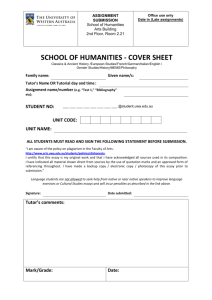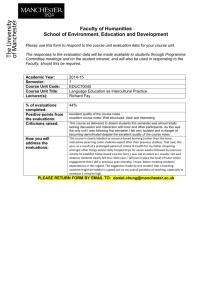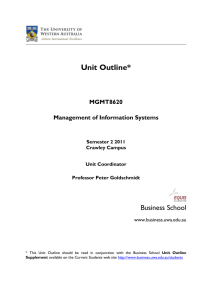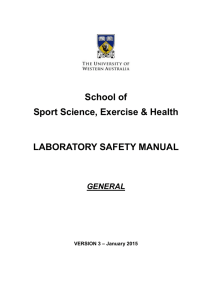Unit Outline* ACCT2242 Accounting Information Systems
advertisement
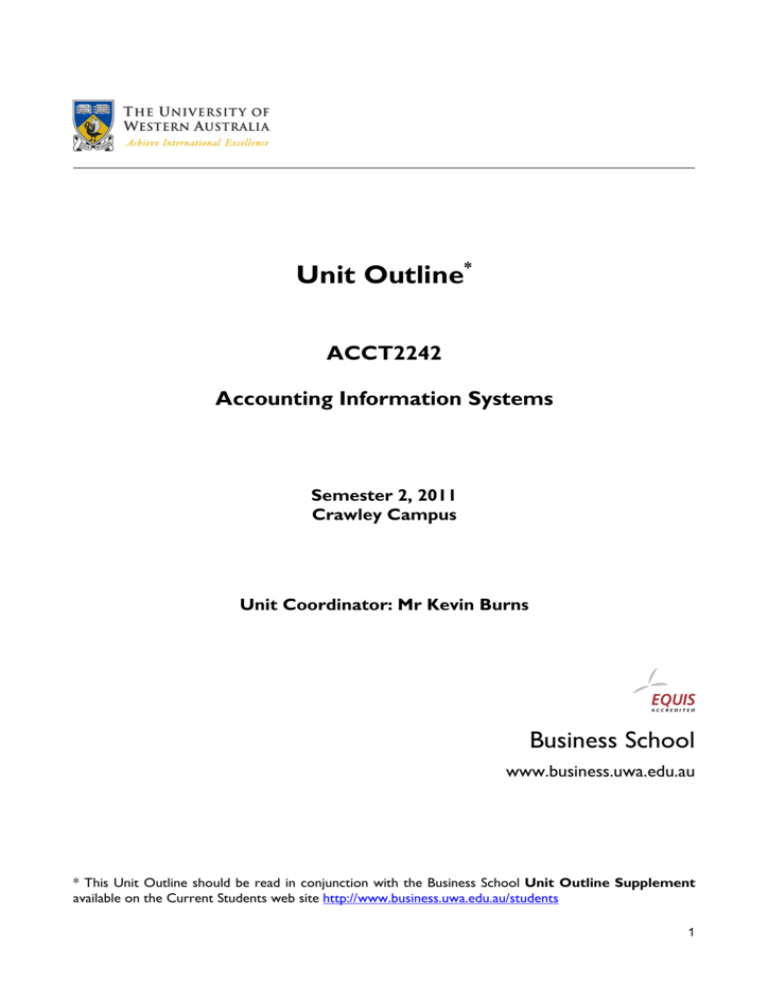
Unit Outline* ACCT2242 Accounting Information Systems Semester 2, 2011 Crawley Campus Unit Coordinator: Mr Kevin Burns Business School www.business.uwa.edu.au * This Unit Outline should be read in conjunction with the Business School Unit Outline Supplement available on the Current Students web site http://www.business.uwa.edu.au/students 1 ACCT2242 /Crawley/KB/19.07.11 All material reproduced herein has been copied in accordance with and pursuant to a statutory licence administered by Copyright Agency Limited (CAL), granted to the University of Western Australia pursuant to Part VB of the Copyright Act 1968 (Cth). Copying of this material by students, except for fair dealing purposes under the Copyright Act, is prohibited. For the purposes of this fair dealing exception, students should be aware that the rule allowing copying, for fair dealing purposes, of 10% of the work, or one chapter/article, applies to the original work from which the excerpt in this course material was taken, and not to the course material itself. © The University of Western Australia 2011 2 UNIT DESCRIPTION Introduction Welcome to Accounting Information Systems ACCT2242, a unit typically undertaken by students majoring in Financial Accounting or Managerial Accounting. For accounting students, it is the unit that will show you why you are studying accounting as it shows the role of accounting systems within an organization and puts material you have learnt in other accounting units into context. For non-accounting students, it will provide you with an overview of what accounting systems do and what you can expect from them as a user. Unit content This unit is about the interplay between accounting information and business processes within organisations. Data is gathered from business processes as they happen. The data is stored, processed and reported to provide information from which decisions are made that, in turn, affect how business processes operate. Some generic cycles of activities are found in most organisations and these are analysed. Tools that make it possible to explore specific aspects of the business processes are introduced. Accounting information is also used for statutory reporting and computer based systems are used in most organisations to provide the basis from which these requirements can be satisfied. Such systems are considered without getting really technical. Lastly all reporting depends on the quality of the information, which in turn is determined by corporate governance and the internal controls built into the systems that collect and store the data. Ethical issues and basic safeguards for each type of business cycle are explored. Learning outcomes In successfully completing this unit students should: • • • • • • • Build on their understanding of the role of accounting within an organization. Accept a view of accounting as an information system. Independently learn to use a computer based accounting information system to record transactions typical to the needs of a small to medium enterprise. Analyse, describe and document aspects of business processes that are relevant to accounting information systems. Recognise threats to the quality of accounting information and identify appropriate controls. Become aware of the issues involved in the analysis and design of computer based systems for accounting information. Use and further develop problem solving and teamwork skills. UNIT STRUCTURE Overview This unit has been structured to give you practical experience and theoretical study in computer based accounting information systems. There is work that you are required to complete individually and work for which you must collaborate with other students in a team. Some of the coursework is strictly factual while other parts introduce tools that you have to learn to use. You are encouraged to embrace all aspects of the unit. In particular, some students do not relate easily to the modelling tools presented especially where it is necessary to draw diagrams rather than describe business processes in words. However, any extra effort that will be needed should be rewarded in the future when you use these skills in your professional life. 3 Lectures There are two lectures (no repeats) each week, both in Wesfarmers Lecture Theatre: Monday 10 am Wednesday 8am Lectures will follow the textbook quite closely with some additional material where necessary. Both Powerpoint slides and OHP(visualiser) material will be recorded and made available through Lectopia. Workshops The tutorials for this unit have been designed to be a mixture of discussion and class work. You should have recorded your time preferences using OLCR. Each class will have around 30 students. It is important that you prepare for the workshops by reading and reflecting on the chapter for that week. In addition, the timetable below specifies which chapter questions should be prepared ahead of the workshop. This is to prepare you to take part in the workshop activities and should not be regarded as the only topics of value in the chapter. Workshops provide you with an opportunity to get answers to anything that puzzles you. Please take advantage of this by attending and asking your tutor to answer your questions. You could even email your questions to your tutor or the lecturer ahead of the class to ensure that your problem is dealt with. TEACHING AND LEARNING RESPONSIBILITIES Teaching and learning evaluation You will be asked to complete the Students’ Unit Reflective Feedback (SURF) during this unit. SURF is completed online and is a university wide survey and deals only with the unit. You will receive an email from the SURF office inviting you to complete the SURF when it is activated. You are encouraged to complete the forms as your feedback is extremely important and can be used to make changes to the unit or lecturing style when appropriate. You are also encouraged to provide informal feedback to the lecturer or tutor at any stage during semester especially if you would like more time on a topic or have a particular interest that you would the unit to encompass. For instance, a more structured introduction to MYOB has been added to course this semester as a result of comments from students. Changes can often be effected within current semester if you make your views known. the like the the Attendance Two lectures and one workshop are scheduled for you each week. No class is compulsory but participation in class, whether it be listening to a lecture or getting involved in other activities, is an important part of the learning process. The classes are designed to support your learning and you should take advantage of the opportunity to have personal contact with teaching staff. Treat them as a resource for which you have paid and should therefore use to best advantage. There is a high correlation between regular attendance and good grades in all university units. 4 CONTACT DETAILS Students are required to access their student email accounts regularly. Important information regarding the unit is often communicated by email and will not be automatically forwarded to private email addresses. You are encouraged to communicate with any of the academic staff working on this unit. If you choose to use email PLEASE remember to put ACCT2242 in the subject line AND include your student number in the email. Unit coordinator/lecturer Name: Mr Kevin Burns Email: kevin.burns@uwa.edu.au Phone: (08) 6488 5846 Consultation hours: By appointment Lecture times: Monday, 10am; Wednesday, 8am Lecture venue: Wesfarmers Lecture Theatre Tutor Name: Mr Paul Lloyd Phone: (08) 6488 2906 Consultation hours TBA TEXTBOOK(S) & RESOURCES Unit Website All unit material will be available through WebCT. Lectopia may be accessed through WebCT. If you are enrolled in the unit you will automatically have access to the WebCT pages for this unit. If you do not have this unit in your list of units either adjust your enrolment or speak to the lecturer. 5 Required text(s) The textbook this year is the same one as that used last year but revised to the 3rd Edition. There is overlap between 2nd and 3rd editions but also many differences especially with respect to databases. If you choose to use 2nd edition you must use the copies of 3rd edition that are in closed reserve to work out what has changed. The exam will be based on the 3rd edition. Considine, B, Parkes, A, Olesen, K, Speer, D, & Lee, M 2010, Accounting Information Systems: Understanding Business Processes 3rd edn, John Wiley & Sons, Milton QLD. ASSESSMENT MECHANISM Summary Item Weight Due date Remarks Mid Semester Exam 40% TBA 1hr 15 mins: Multiple Choice Final exam 60% TBA 2 hours + 10 mins reading Note 1: Results may be subject to scaling and standardisation under faculty policy and are not necessarily the sum of the component parts. There are a number of reasons for having assessable tasks as part of an academic program. The assessable tasks are designed to encourage you to explore and understand the subject more fully. The fact that we grade your work provides you with an indication of how much you have achieved. Providing feedback on your work also serves as part of the learning process. Assessment components Mid Semester Exam (40%) The mid semester exam will be for a duration of 1 hour 15 minutes. No reading time will be given. The exam will consist of multiple choice questions only and will cover topics in the first 6 (six) weeks of the semester. The date, time and venue of the exam will be announced in week 2 (two) of the semester on Web CT. It will be a closed book examination. Final Exam (60%) The final exam will be 2 hours with 10 minutes reading time. There will be some, but not all, multiple choice questions. Any topic covered in lectures or the nominated chapters of the book may be included. Sample questions will be discussed during lectures and workshops in the last week of semester. Later in the semester, you should check faculty notice boards or the UWA website for details of the time and location of the final exam. Applications for a deferred final exam must be made to the Sub-Dean, Mr Paul Lloyd. 6 UNIT SCHEDULE Week Chp 1 1 Aug 1 2 8 Aug 2 3 15 Aug Introduction to major project D1.6; P1.3; P1.5; P1.9 Business Processes 5 Process Modelling D6.4; P6.4; P5.3; P5.2 (not physical DFD) 7&8 Internal Controls I 7&8 Internal Controls II 9-11 Payment, Revenue and Production cycles 9-11 Payment, Revenue and Production cycles 7 12 Sept No workshop in week 1 D2.7; P2.4; P2.14 6 5 Sep Introduction to AIS, Systems, Data and Information ERP(Enterprise Information Systems) 5 29 Aug D5.3;D5.8;P5.1 D7.9; P7.6; D8.2; P8.2 8 19 Sept GL and reporting cycles 9 12 HR and payroll cycles 10 15 Auditing of Accounting Information Systems 10 Oct 16 Ethics, Fraud, and Computer Crime 3,4 Databases 14 System Development 11 17 Oct 12 24 Oct 13 31 Oct AB Hi-Fi case questions at the end of chapters 9-13; D8.5;P8.6; D9.3; D9.4; D10.3; D11.5 Non-Teaching Break 26 Sept-30 Sept NTB 3 Oct Workshop Read chapter and prepare questions 6 4 22 Aug Topic D11.4;P11.12 D12.4; D12.6;P12.11 D15.3; P15.4; D16.4; D16.5; P16.1 D3.4; P3.2; P4.1; P4.3 D14.11; P14.1 Revision - Questions Questions from last year’s exam paper 7 Student Guild Phone: (+61 8) 6488 2295 Facsimile: (+61 8) 6488 1041 E-mail: enquiries@guild.uwa.edu.au Website: http://www.guild.uwa.edu.au Charter of Student Rights and Responsibilities The Charter of Student Rights and Responsibilities outlines the fundamental rights and responsibilities of students who undertake their education at UWA (refer http://handbooks.uwa.edu.au/undergraduate/poliproc/policies/StudentRights). Appeals against academic assessment The University provides the opportunity for students to lodge an appeal against assessment results and/or progress status (refer http://www.secretariat.uwa.edu.au/home/policies/appeals ). 8


